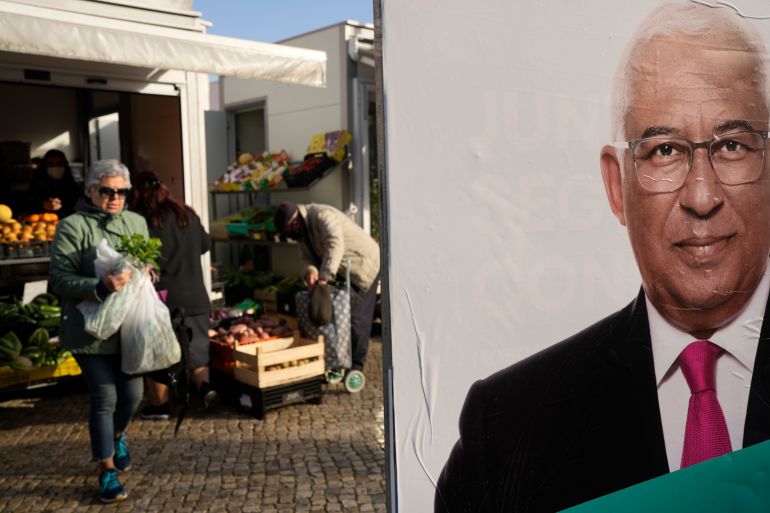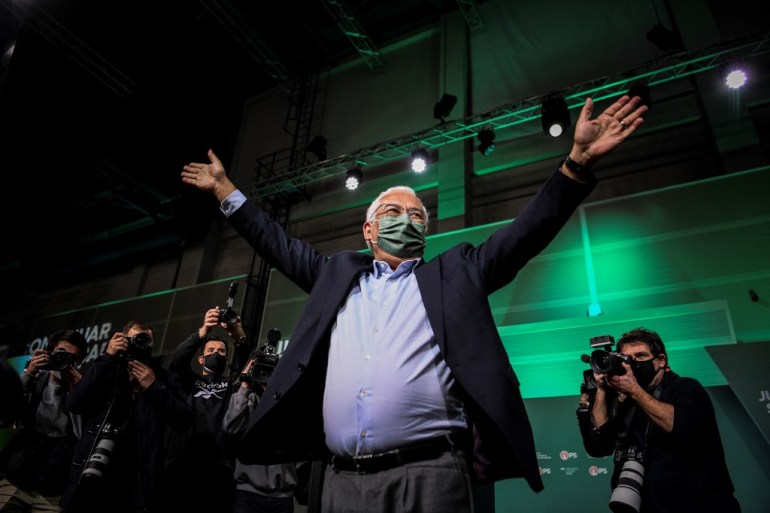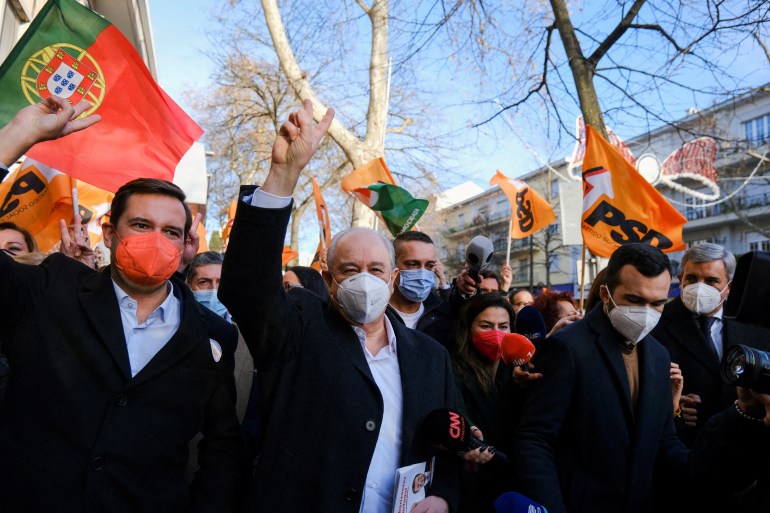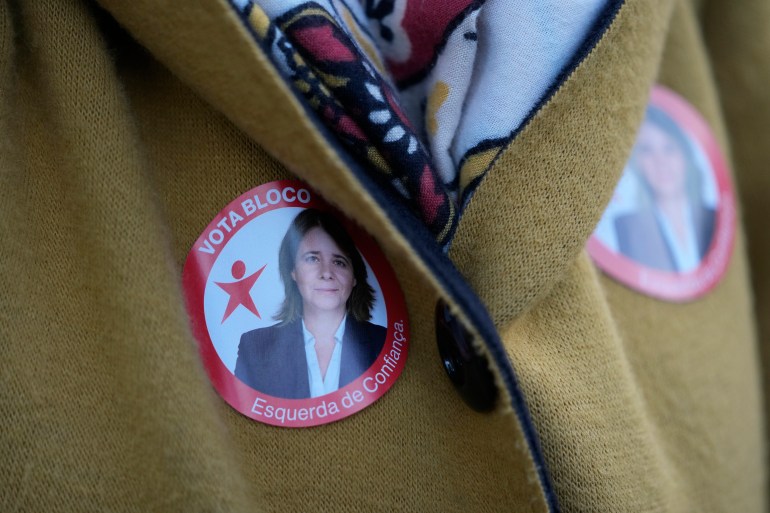Chances of absolute majority look slim for all in Portugal vote
Incumbent PM’s Socialist Party is expected to win Sunday’s snap polls, but the absolute majority remains elusive.

Incumbent Prime Minister Antonio Costa remains the favourite to win Sunday’s snap elections in Portugal, even if the chances of the absolute majority he seeks look steadily slimmer.
The gap between support for Costa’s Socialist Party (PS) and their main right-wing rivals, the PSD, has eroded dangerously this week from 8 percent to just 2.5 percent, according to recent opinion polls.
Keep reading
list of 3 itemsA boxing club shaping lives through social integration
Portugal’s Lisbon rolls out new COVID curbs as cases surge
The centre-left party’s current estimated maximum total of up to 38 or 39 percent of votes would only slightly strengthen its total of 108 MPs in Portugal’s 230-seat Parliament.
Certainly not enough for Costa, who has ruled Portugal with a minority Socialist government since 2015, to go it alone.
The surge in support for the PSD means a minority coalition government of right-wing parties is still technically feasible.
Protracted and unpredictable negotiations to form a new government most likely await whoever wins most of the votes on Sunday.
Repeat vote unlikely
Amid political observers, the prospect of yet another vote to end Portugal’s recent run of minority governments is viewed as unlikely.
“I do not believe that the absence of an absolute majority will lead to another snap election in the near future,” José Santana Pereira, professor of political science at the Lisbon University Institute, told Al Jazeera.
“This snap election is seen by most of the population as highly unnecessary, so parties will be responsible and collaborative enough in order to avoid further disruptions in such a delicate phase of our lives.”
The January 30 elections were triggered by a serious political crisis last year when parties to the right and left of the Socialists combined their votes for an unprecedented defeat of the government’s budget plans.
The Socialists’ current campaign battle cry of an absolute majority is based precisely on the need to avoid such crises in the future.

However, should the Socialists chance to look over their collective shoulders, they might well be disappointed to see how the opposition is remorselessly regaining lost ground in the polls.
“The gap between the PS and the PSD has been narrowing very considerably,” Marina Costa, principal researcher at the University of Lisbon’s Social Sciences Institute, told Al Jazeera.
“The margin of error doesn’t allow us to say the Socialists are definitely going to win,” she said.
How the election works
On Sunday, a 9.3 million-strong electorate will vote for all 230 of Portugal’s members of Parliament (MPs), from lists of candidates proposed for each electoral district by parties. Seat totals for each district are decided via proportional representation.
The number of MPs per district varies enormously. The district with the capital city, Lisbon, has the most MPs – 48 – while the Portalegre district in eastern, deeply rural, Portugal has just two.
Polling stations will open at 8am local time (08:00 GMT) and close at 8pm (20:00 GMT). But more than 300,000 voters have already used an early voting system designed to avoid overcrowding in polling stations.
Additionally, an estimated 600,000 voters currently self-isolating due to COVID-19 infections will be allowed to cast their vote in person, but it is recommended they do so in the last, quieter, hour of voting.
There are fears that a steady increase in abstention could continue. The turnout in 2019 was just 48.6 percent, the lowest of any election in Portugal’s near half-century of modern democracy.
Joao Pedro Barata, a Portuguese doctor in his 30s who despite recently emigrating to England flew back home to vote, is an exception to an ever-widening rule of voter apathy.
“People feel increasingly distant from political parties, who appear more interested in winning elections than anything else,” Barata told Al Jazeera.
“Plus more and more people can’t remember the Portuguese dictatorship, when they couldn’t vote, so they think it’s less important. If it’s a sunny day, I think many people of my age would rather go to the beach,” he said.
Key questions
Viewed as one of the great achievements of the 1974 revolution that brought democracy to the country, Portugal’s public health service has been a key issue in the election.
Costa has come in for searing criticism over his unfulfilled promise of two years ago that 98 percent of the Portuguese population would have access to family doctors.
“Portugal produces enough doctors but there are no incentives for them to go to remote areas,” Barata said.

Factor in excessively low salaries in urban areas like Lisbon, he said, and a sharp rise in patients registering purely in order to access COVID-19 vaccines, and “there is a greater shortage of family doctors, even though there are more doctors than ever”.
“The issues the government had with the left over health spending were what prompted its fall,” said Marina Costa. “The Socialists did not want to spend as much as the other left-wing parties.”
The debate over spending of recovery funds due to arrive shortly from Europe has also been a hot one.
“They are an excellent – perhaps the last – opportunity to deal with structural deficiencies in the Portuguese economy with the help of its EU neighbours,” Professor Santana Pereira said.
Forming a coalition
Costa’s working alliance with more left-wing parties to prop up his minority government between 2015 and 2019, was known as the geringonça. It highlighted his formidable talent for political brokering and resolutely defied widespread predictions of intrinsic instability.
But this time around should the same scenario emerge after Sunday, Portugal’s increasingly fragmented spectrum of minority parties means even Costa may struggle to pull together enough votes.
An agreement with the pro-animal rights party PAN or with the left-leaning party Livre is possible. But so too, is a renewed alliance with the left-wing Bloco Esquerda (BE) and the Portuguese Communist Party, should they think it necessary to keep the right wing at bay.

BE leader Catarina Martins has already invited Costa to post-electoral talks next Monday, regardless of the result.
However, two general elections in three years and the rise of multiple smaller parties have arguably done little to lower seemingly endemic tension in Portugal’s political system.
“These are the most polarised elections I can remember, because previously it was almost always simply a question of alternating between the centre-left and the centre-right parties in power,” said Barata. “Now it feels like a much broader battle.”